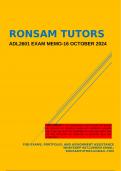RONSAM TUTORS
ADL2601 EXAM MEMO-16 OCTOBER 2024
DISCLAIMER!!!: The assignments sold through this website
are intended for research, study, and reference purposes
only. They are not to be submitted as your own work. Only
use this document as reference to generate your own
assignment
FOR EXAMS, PORTFOLIO, AND ASSIGNMENT ASSISTANCE
WHATSAPP 0671189059 EMAIL:
,Question 1: In terms of section 33 of the South African Constitution, advise
Mrs Kolosi of the three requirements which administrative action must meet.
The three requirements for administrative action under section 33 of the Constitution
are:
Lawfulness: Administrative action must comply with the law. Public officials
must have the authority to take the action, which must be authorized by law.
Reasonableness: The decisions taken must be rational and justifiable in
relation to the information available at the time.
Procedural Fairness: The action must follow a fair procedure, which includes
giving affected parties an opportunity to be heard before the decision is made.
Question 2: Should Mrs Kolosi wish to institute legal proceedings against
SASGA, what authoritative sources of law from an administrative law
perspective could she rely on. [7]
Authoritative sources of law in administrative law include:
The Constitution of South Africa
The Promotion of Administrative Justice Act (PAJA)
Case law
Common law
Regulations and policies
Question 3: To launch proceedings against SASGA, Mrs Kolosi would be
required to demonstrate that the Director-General’s decision qualified as
administrative action. Advise, Mrs Kolosi on whether the Director-General’s
decision qualifies as administrative action in terms of section 1 of the
Promotion of Administrative Justice Act 3 of 2000 (but it is not necessary to
discuss the exclusions in the Act). [16]
To determine whether the Director-General’s decision qualifies as administrative
action under the Promotion of Administrative Justice Act (PAJA), we must first
examine the elements that define administrative action. PAJA applies to decisions
,taken by an organ of state or any individual or entity performing a public function or
exercising public power. In this case, the Director-General of the South African
Social Grants Authority (SASGA) is an organ of state. As a public body responsible
for managing social grants, SASGA performs a public function under the relevant
legislation (the hypothetical SASGA Act). Therefore, the Director-General's decision
to cancel Mrs. Kolosi’s Child Support Grant (CSG) involves the exercise of public
power and the performance of a public function.
Another requirement of administrative action under PAJA is that the decision must
adversely affect rights. Mrs. Kolosi’s access to the Child Support Grant is a
significant source of livelihood, especially for the care of her grandchild. By
cancelling the grant, the Director-General's decision directly impacts her right to
receive social assistance, a right protected under section 27 of the South African
Constitution. This adverse impact on her ability to provide for her grandchild means
her rights are clearly affected.
Finally, for a decision to qualify as administrative action under PAJA, it must have a
direct external legal effect. The cancellation of the grant has an immediate and direct
impact on Mrs. Kolosi, as it halts her ability to receive financial support from the
government. This decision produces a legal effect outside the internal functioning of
SASGA, as it changes Mrs. Kolosi’s legal status as a beneficiary of the grant. Given
that all these requirements exercise of public power, adverse impact on rights, and
direct external legal effect are met, the Director-General’s decision likely qualifies as
administrative action under PAJA.
Question 4: In preparing a case against the Director-General of SASGA, list the
persuasive sources of administrative law which you can use to prepare for
trial. [4]
In preparing for trial, the following sources can be persuasive:
Judgments from foreign jurisdictions where South African courts often borrow
interpretations from countries with similar legal systems.
Legal textbooks and academic writings on administrative law.
, Articles in legal journals which provide authoritative commentary on
administrative law principles.
Question 5: In the preceding fact set, identify the organ of state, and discuss
the meaning of the term as defined in the Constitution of South Africa, 1996.
[5]
An organ of state is defined in section 239 of the Constitution and includes:
Any department of state or administration in the national, provincial, or local
government.
Any institution performing a public function under the law.
In this case, SASGA (the South African Social Grants Authority) would be an organ
of state.
Question 6: If Mrs Kolosi is dissatisfied with a decision of the Director-General
of SASGA, may she immediately take the matter to court? [2]
Mrs. Kolosi must first exhaust any internal remedies before approaching the courts,
as required by section 7(2) of PAJA. She cannot immediately take the matter to court
unless internal remedies are exhausted or exceptional circumstances exist.
Question 7: Are there any instances in which the courts dispense with the
preceding rule in the previous question? [3]
The courts may dispense with the rule of exhausting internal remedies where:
Exceptional circumstances exist.
The internal remedy is inadequate or causes undue delay.
Question 8: Discuss how the requirement that internal remedies must be
exhausted before approaching a court of law has been justified? [4]
The requirement to exhaust internal remedies is justified because:




